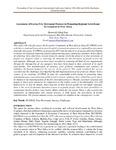Assessment of Ecowas Free Movement Protocol in Promoting Regional Growth and Development in West Africa
Abstract
This study will critically assess the Economic Community of West African State [ECOWAS] on its
activities on regional integration, growth and development as a panacea to regional free movement
of people and goods. ECOWAS was formed in 1975 with the objectives of among others facilitating
economic development, fostering relation and promoting peace among her members. In her efforts
of achieving these objectives, several protocols among which the protocol on free movement of
people was adopted aimed at removing all obstacles for the movement of people across the
subcontinent. Although, success have been recorded in removing all kind of visa requirements
through the introduction of one passport, less have been found to have achieved of its much
expectations. Non harmonization of currency, poor political commitment and existence of
multiples checkpoints hampered the success of the protocol. This study examined the success
recorded and the challenges that hijacked the full implementation of the protocol; About a half a
century of its creations, ECOWAS in spite her remarkable achievements in promoting unity,
maintaining peace and enhancing political and economic relations, have yielded less particularly
in relation to the implementation of the free movement protocol. Though, movement of goods and
people is much more advanced in comparison to the earlier years of decolonization, it is still
bedeviled by so may be abuses. Since majority of West African people are not highly educated,
there is the need of informal education system to acquaint people with the basic formalities or
requirement involve in their cross border affairs within the sub region. There is also need for the
automation of immigration and custom services to help fasten the procedures of border
administration. The present manual system was found not suitable in the contemporary world.
Key Words: ECOWAS, Free Movement, Success, Challenges

